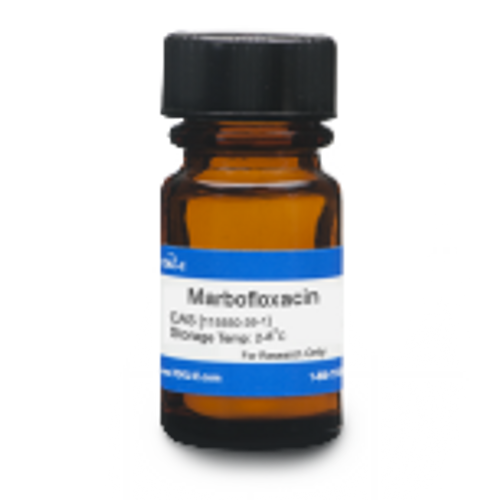Marbofloxacin is broad-spectrum, third-generation fluoroquinolone antibiotic commonly used in studying antimicrobial resistance and antimicrobial susceptibility testing. Marbofloxacin is freely soluble in water.
| Mechanism of Action | Fluoroquinolone antibiotics target bacterial DNA gyrase, an enzyme which reduces DNA strain during replication. DNA gyrase is required during DNA replication, thus causes an inhibition of DNA synthesis and cell division.. |
| Spectrum | Marbofloxacin is a broad-spectrum antibiotic active against Gram-positive and Gram-negative bacteiria including Pseudomonas and Staphylococci species. It is also active against Mycoplasma. |
| Impurity Profile | Impurity A| 6,7-difluoro-8-hydroxy-1-(methylamino)-4-oxo-1,4-dihydroquinoline-3-carboxylic acid|||| Impurity B| 9,10-difluoro-3-methyl-7-oxo-2,3-dihydro-7H-pyrido[3,2,1-ij][4,1,2]benzoxadiazine-6-carboxylic acid|||| Impurity C| 6,8-difluoro-1-(methylamino)-7-(4-methylpiperazin-1-yl)-4-oxo-1,4-dihydroquinoline-3-carboxylic acid|||| Impurity D| 6-fluoro-8-hydroxy-1-(methylamino)-7-(4-methylpiperazin-1-yl)-4-oxo-1,4-dihydroquinoline-3-carboxylic acid|||| Impurity E| 8-ethoxy-6-fluoro-1-(methylamino)-7-(4-methylpiperazin-1-yl)-4-oxo-1,4-dihydroquinoline-3-carboxylic acid|||| Impurity F| 4-[6-carboxy-9-fluoro-3-methyl-7-oxo-2,3-dihydro-7H-pyrido[3,2,1-ij][4,1,2]benzoxadiazin-10-yl]-1-methylpiperazine 1-oxide|||| |
| Microbiology Applications |
Marbofloxacin is commonly used for in vitro microbiological antimicrobial susceptibility tests (panels, discs, and MIC strips) against Gram-positive and Gram-negative microbial isolates. Medical microbiologists use AST results to recommend antibiotic treatment options.
For a representative list of Marbofloxacin MIC values, click here. The in vitro activity of Marbofloxacin, a quinolone, was evaluated on 124 anaerobic human strains isolated from the gut and testing revealed that Marbofloxacin was similalr or superior to Ofloxacin for the whole anaerobes such as Enterococcus, Enterobacteriaceae, and Lactobacillus (Dubreuil et al, 1996). |
| Molecular Formula | C17H19FN4O4 |
| References |
Dubreuil L, Houcke I and Leroy I (1996) In vitro activity of a new fluoroquinolone, Marbofloxacin (RO 09-1168) against strictly anaerobic bacteria and some bacteria from human fecal flora. Pathol-biol. 44(5):333-336 PMID 8758470 Spring M, Deleforge J, Thomas V, Boisrme B and Drugeon H (1995) Antibacterial activity of Marbofloxacin. A new fluoroquinolone for veterinary use against canine and feline isolates. J. Vet. Pharmacol and Ther. 18(4):284-289 PMID 8583541 Wolfson, JS and David C. Hooper DC (1985) The Fluoroquinolones: Structures, mechanisms of action and resistance, and spectra of activity in vitro Antimicrob. Agents. Chemother. 28: 581-586 PMID 3000292 |
| MIC | Escherichia coli| 0.0115 - 64|| Pseudomonas aeruginosa| 0.5|| Staphylococcus aureus| 0.25 - 64|| Staphylococcus epidermidis| 0.5|| Staphylococcus intermedius| 0.25 - 1|| Staphylococcus warneri| 0.25 - 0.5|| Streptococcus canis| 1|| |



